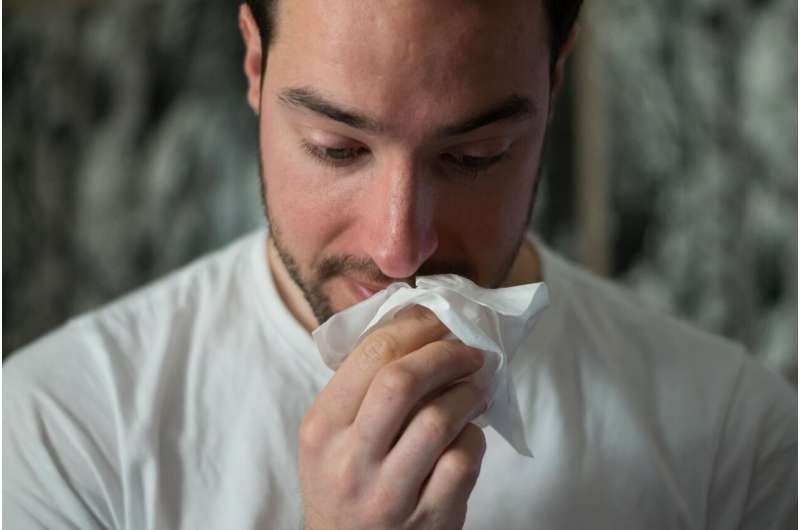This article has been reviewed according to Science X's editorial process and policies. Editors have highlighted the following attributes while ensuring the content's credibility:
fact-checked
peer-reviewed publication
trusted source
proofread
Surgery is more effective than nasal sprays for symptoms of a crooked septum, trial finds

Surgery to straighten a crooked septum (the thin wall of bone and cartilage dividing the space between the two nostrils) is more effective than nasal sprays, and should be offered to adults with at least moderate symptoms such as breathing disruption, suggests a UK trial published by The BMJ today.
A crooked (deviated) septum often means that one nasal passage is narrower than the other, making it feel blocked, which can affect breathing, sleep or exercising. Surgery to correct this (septoplasty) is a common operation. In 2019-20, 16,700 septoplasties were carried out in England, but there's a lack of high quality evidence evaluating septoplasty and therefore no clear guidelines for its use.
To address this, a team of UK researchers designed the Nasal Airways Obstruction Study (NAIROS) to provide definitive evidence and recommendations for use of septoplasty. Their aim was to inform guidance on which patients might benefit from this treatment, and to standardize treatment across the UK.
The study involved 378 adults (average age 40; 67% men) with at least moderate symptoms of nasal obstruction linked to septal deviation, confirmed by a score of more than 30 on the Nasal Obstruction and Symptom Evaluation (NOSE) scale. Participants were randomly assigned to receive either septoplasty (188) or medical management in the form of nasal steroid and saline spray (190).
At six months, patients completed the Sino-Nasal Outcome Test-22 (SNOT-22), which assesses 22 symptoms, each scored from zero to 5, with higher scores indicating worse symptoms. A 9-point difference on this scale was defined as the minimal clinically important difference.
Other outcomes included quality of life and nasal airflow measures. Potentially influential factors such as age, sex, and severity of symptoms at the start of the study, were also taken into account.
The average SNOT-22 scores at six months were 19.9 in the septoplasty group and 39.5 in the medical management group—20 points lower (better) for those who received septoplasty.
Improvement in SNOT-22 scores in the septoplasty group remained at 12 months but to a lesser degree (21.2 compared with 30.4 in the medical management group).
Patients with more severe symptoms at the start of the study reported greater improvement after septoplasty compared with medical management. Quality of life outcomes and nasal airflow measures also improved more in participants in the septoplasty group.
Readmission to hospital with bleeding after septoplasty occurred in seven participants (4% of 174 who had septoplasty), and a further 20 participants (12%) required antibiotics for infections.
The researchers acknowledge that nasal obstruction can have many underlying possible causes, which they did not seek to diagnose or treat before randomization, and say the experience of surgeons performing septoplasties—and the COVID-19 pandemic—may also have affected their results.
Nevertheless, they conclude, "Septoplasty is a superior treatment for nasal obstruction associated with septal deviation compared with a defined regimen of nasal steroid and saline sprays. Initial NOSE scores can estimate the likely improvement in symptoms and guide decision making for patients and clinicians, they add, recommending that "adults presenting with nasal obstruction associated with a deviated nasal septum should be offered septoplasty."
This new trial paves the way for evidence based guidelines, say experts in a linked editorial.
"At a time when the NHS and many other health systems are focused on tackling the backlog of patients awaiting operations, funding for surgical procedures is being closely examined to find cost savings, and clinicians have a responsibility to ensure the effectiveness of their treatments," they write.
"These authors have produced a landmark study showing the efficacy of septoplasty over medical management in patients with nasal obstruction due to a deviated nasal septum. It is vital that these findings now translate into guidance to ensure all patients with suitable pathology are offered this effective intervention," they conclude.
More information: Clinical effectiveness of septoplasty versus medical management for nasal airways obstruction: multicentre, open label, randomised controlled trial, The BMJ (2023). DOI: 10.1136/bmj-2023-075445





















